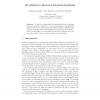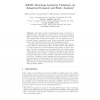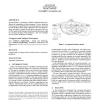115
click to vote
SAS
2007
Springer
15 years 8 months ago
2007
Springer
Concurrent programs are difficult to verify because the proof must consider the interactions between the threads. Fine-grained concurrency and heap allocated data structures exacer...
109
click to vote
APLAS
2009
ACM
15 years 8 months ago
2009
ACM
We describe an algorithm for synthesizing resource invariants that are used in the verification of concurrent programs. This synthesis employs bi-abductive inference to identify t...
146
click to vote
TACAS
2009
Springer
15 years 8 months ago
2009
Springer
Abstract. We propose a static analysis framework for concurrent programs based on reduction of thread interleavings using sound invariants on the top of partial order techniques. S...
132
click to vote
FASE
2009
Springer
15 years 9 months ago
2009
Springer
Abstract. The reality of multi-core hardware has made concurrent programs pervasive. Unfortunately, writing correct concurrent programs is difficult. Atomicity violation, which is ...
119
click to vote
ICFP
2009
ACM
15 years 9 months ago
2009
ACM
We address the problem of testing and debugging concurrent, distributed Erlang applications. In concurrent programs, race conditions are a common class of bugs and are very hard t...
103
click to vote
FASE
2010
Springer
15 years 9 months ago
2010
Springer
Multithreaded concurrent programs often exhibit bugs due to unintended interferences among the concurrent threads. Such bugs are often hard to reproduce because they typically hap...
107
click to vote
ASPLOS
2010
ACM
15 years 9 months ago
2010
ACM
Debugging concurrent programs is difficult. This is primarily because the inherent non-determinism that arises because of scheduler interleavings makes it hard to easily reproduc...
124
click to vote
SIGSOFT
2003
ACM
16 years 2 months ago
2003
ACM
Program slicing is a technique to identify statements that may influence the computations at other statements. Precise slicing has been shown to be undecidable for concurrent prog...



